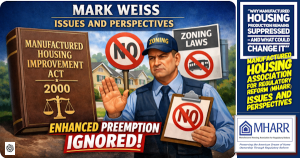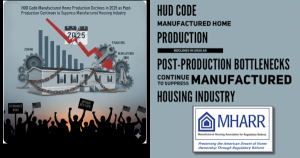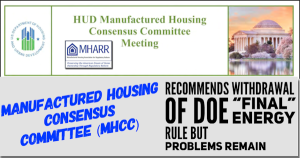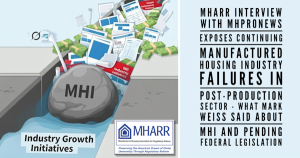Longstanding MHARR Effort to Fully Reform HUD Subpart I Regulations Continues to Advance
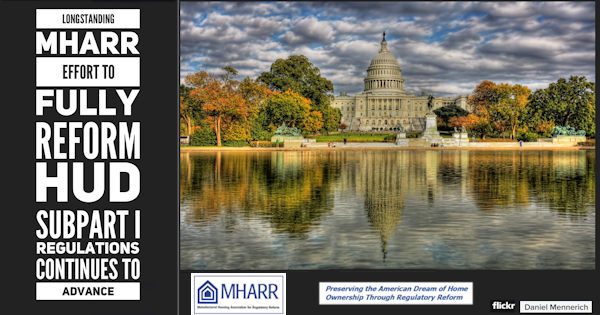
The Manufactured Housing Consensus Committee’s (MHCC) Regulatory Enforcement Subcommittee has approved and will now send to the full MHCC for consideration at its upcoming October 2019 in-person meeting, the most extensive proposed changes to HUD’s Subpart I regulations since they were last amended in 2013.
Acting, in part, on a proposal submitted to HUD by MHARR in its February 20, 2018 comments pursuant to Trump Administration Executive Orders (EOs) 13771 and 13777, which called on HUD to amend its Subpart I “Consumer Complaint Handling” requirements to fully conform and comply with section 615 of the National Manufactured Housing Construction and Safety Standards Act of 1974 (as amended) – and with MHARR’s representative participating fully in the debate — the Subcommittee voted, among other things, to eliminate Subpart I requirements relating to “serious defects” and manufacturer determinations and notifications of speculative matters that could “likely exist” (rather than definitely exist).
While both of these specific mandates were retained by HUD notwithstanding its 2013 overhaul of other aspects of Subpart I – triggered by a July 2001 MHARR Petition for Rulemaking and MHCC proposals using that Petition and related MHARR proposals as a base document – neither is affirmatively required or even mentionedin section 615 of the law, the authorizing provision for all of Subpart I. The Subcommittee’s action in recommending the deletion of these provisions and related concepts thus recognizes that insofar as they are not affirmatively required or even contemplated by Subpart I’s authorizing statute, they may not be legitimately imposed on manufacturers or other HUD-regulated parties and should – and, indeed, must – be withdrawn.
In addition to these changes, the Subcommittee’s debate also reaffirmed the inclusion of a “good faith” element in the Subpart I regulations – representing a partial safe harbor for manufacturers – consistent with section 615’s reference to a “good faith” determination with respect to the existence of any defect which relates to a federal standard or constitutes an imminent safety hazard. The Subcommittee also reaffirmed and referenced in its Subpart I recommendations to the full Committee, a previous recommendation by the MHCC to revert to quarterly IPIA reviews of “manufacturer service records of determinations” under section 3282.416(a)(4) of Subpart I. This provision had been modified to “at least” monthly inspections in HUD’s 2013 Final Rule amending Subpart I in a last minute, post-comment change to the Department’s February 2011 Subpart I proposed rule. In multiple comments to HUD, MHARR had emphasized that this change was unnecessary, improper and needlessly costly and burdensome for regulated parties, without providing any substantial benefits for consumers.
The full and fundamental reform of Subpart I has been a long-term objective of MHARR. As the principal driver of baseless regulatory burdens and related compliance costs for regulated parties — which increase prices paid by consumers without yielding corresponding benefits — and as an unfocused and open-ended mandate that has provided an excuse for serious contractor abuses and over-reach for more than 40 years (and abuses by former regulators as well), Subpart I is a prime candidate for reform in accordance with EOs 13771 and 13777, and the regulatory reform policies of both President Trump and Secretary Carson.
While MHARR’s 2001 Petition for Rulemaking led to a re-consideration of Subpart I as one of the first activities and priorities of the then-newly-established MHCC, ultimately leading to sweeping proposed revisions and the 2013 Subpart I reform rule, that rule, as MHARR stated at the time, did not go far enough in addressing serious inconsistencies between subpart I and section 615 that resulted in the continuation of needless and costly regulatory burdens on manufacturers. The further revisions now contemplated by the Regulatory Enforcement Subcommittee – based specifically on eliminating mandates not consistent with Subpart I’s authorizing statute – would thus further advance MHARR’s effort to conform the scope of Subpart I to the letter of section 615 of the law.
MHARR, accordingly, will continue to press this matter before the full MHCC when it next meets in October 2019.

The Manufactured Housing Consensus Committee’s (MHCC) Regulatory Enforcement Subcommittee has approved and will now send to the full MHCC for consideration at its upcoming October 2019 in-person meeting, the most extensive proposed changes to HUD’s Subpart I regulations since they were last amended in 2013.
Acting, in part, on a proposal submitted to HUD by MHARR in its February 20, 2018 comments pursuant to Trump Administration Executive Orders (EOs) 13771 and 13777, which called on HUD to amend its Subpart I “Consumer Complaint Handling” requirements to fully conform and comply with section 615 of the National Manufactured Housing Construction and Safety Standards Act of 1974 (as amended) – and with MHARR’s representative participating fully in the debate — the Subcommittee voted, among other things, to eliminate Subpart I requirements relating to “serious defects” and manufacturer determinations and notifications of speculative matters that could “likely exist” (rather than definitely exist).
While both of these specific mandates were retained by HUD notwithstanding its 2013 overhaul of other aspects of Subpart I – triggered by a July 2001 MHARR Petition for Rulemaking and MHCC proposals using that Petition and related MHARR proposals as a base document – neither is affirmatively required or even mentionedin section 615 of the law, the authorizing provision for all of Subpart I. The Subcommittee’s action in recommending the deletion of these provisions and related concepts thus recognizes that insofar as they are not affirmatively required or even contemplated by Subpart I’s authorizing statute, they may not be legitimately imposed on manufacturers or other HUD-regulated parties and should – and, indeed, must – be withdrawn.
In addition to these changes, the Subcommittee’s debate also reaffirmed the inclusion of a “good faith” element in the Subpart I regulations – representing a partial safe harbor for manufacturers – consistent with section 615’s reference to a “good faith” determination with respect to the existence of any defect which relates to a federal standard or constitutes an imminent safety hazard. The Subcommittee also reaffirmed and referenced in its Subpart I recommendations to the full Committee, a previous recommendation by the MHCC to revert to quarterly IPIA reviews of “manufacturer service records of determinations” under section 3282.416(a)(4) of Subpart I. This provision had been modified to “at least” monthly inspections in HUD’s 2013 Final Rule amending Subpart I in a last minute, post-comment change to the Department’s February 2011 Subpart I proposed rule. In multiple comments to HUD, MHARR had emphasized that this change was unnecessary, improper and needlessly costly and burdensome for regulated parties, without providing any substantial benefits for consumers.
The full and fundamental reform of Subpart I has been a long-term objective of MHARR. As the principal driver of baseless regulatory burdens and related compliance costs for regulated parties — which increase prices paid by consumers without yielding corresponding benefits — and as an unfocused and open-ended mandate that has provided an excuse for serious contractor abuses and over-reach for more than 40 years (and abuses by former regulators as well), Subpart I is a prime candidate for reform in accordance with EOs 13771 and 13777, and the regulatory reform policies of both President Trump and Secretary Carson.
While MHARR’s 2001 Petition for Rulemaking led to a re-consideration of Subpart I as one of the first activities and priorities of the then-newly-established MHCC, ultimately leading to sweeping proposed revisions and the 2013 Subpart I reform rule, that rule, as MHARR stated at the time, did not go far enough in addressing serious inconsistencies between subpart I and section 615 that resulted in the continuation of needless and costly regulatory burdens on manufacturers. The further revisions now contemplated by the Regulatory Enforcement Subcommittee – based specifically on eliminating mandates not consistent with Subpart I’s authorizing statute – would thus further advance MHARR’s effort to conform the scope of Subpart I to the letter of section 615 of the law.
MHARR, accordingly, will continue to press this matter before the full MHCC when it next meets in October 2019.

